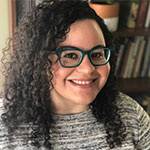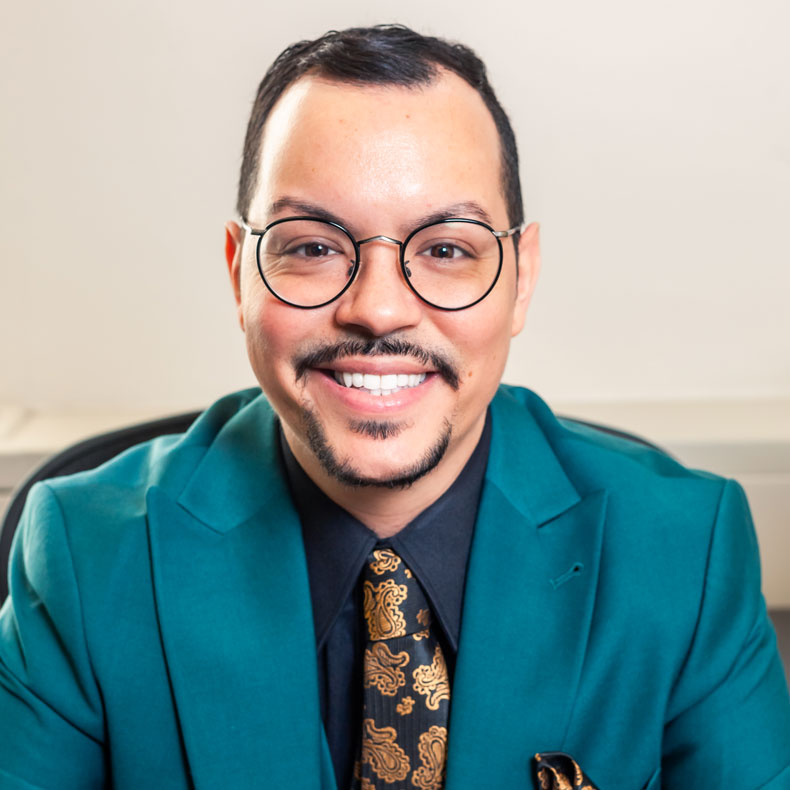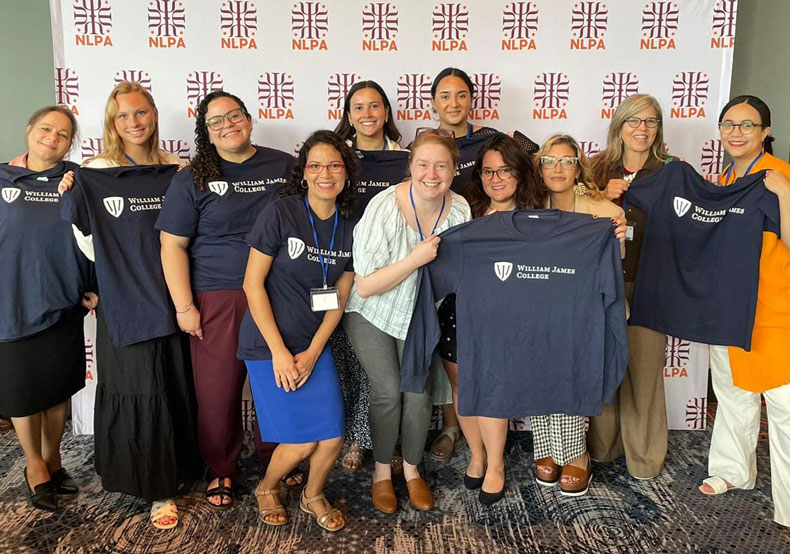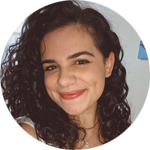Latino Mental Health Program (LMHP) Concentration
Latino Mental Health
Bienvenidos y gracias por su interés en proporcionar servicios a la población latina en nuestro país.
Welcome and thanks for your interest in providing services to our Latin communities in our country.
Students in the Latino Mental Health Program (LMHP) will complete the core curriculum for training in their degree program. In addition, they will demonstrate Spanish fluency and Latino cultural knowledge to work as competent clinicians with this diverse population. Specialty training will emphasize an awareness of the social similarities and differences among Latino groups, and an understanding of the social context of Latinos in modern American society. Graduates of the program will acquire greater sensitivity, not just to the role of culture, but also, of economics and other social factors in the developmental, emotional, relational and behavioral aspects pertinent to the mental health of Latinos.
For students of Hispanic/Latino descent, regardless of their level of Spanish fluency, the program will foster self-awareness of the influence of their own cultural beliefs and values in their clinical work with Latino patients/clients. It will also promote a deep appreciation of the rich diversity and idiosyncrasies among the Latino culture and how these impact on clinical work. For Latino students with limited Spanish fluency the program will offer an opportunity to enhance their linguistic competence.
Offered in the following academic programs
Watch our video about the Latino Mental Health program.
Testimonial
How to enroll and curriculum overview.
The Latino Mental Health Program aims to increase the number of Latino mental health service providers in the United States by providing specialized master’s and doctoral level training in clinical, counseling, and school psychology. The program provides mental health professionals (both Latino and non-Latino) with the language skills, cultural sensitivity, and clinical competence that will enable them to deliver high-quality care to Latino populations. By training mental health leaders who can create, direct, and deliver high-quality services, the program hopes to aid in eliminating societal disparities that exist in relation to access and quality of mental health care.
The concentration focuses on teaching cultural competence through didactics and practice that give students the opportunity to learn about cultural and sociopolitical differences amongst Latin countries, the impact of immigration and acculturation, and other contextual factors that impact the health and access to care of Latinos in the United States. Students participate in a four-week immersion trip to Ecuador where they stay with local families and work with local psychologists in different rotations. Students also engage in clinical work with individuals of Latino backgrounds through their field placement experiences at WJC. Opportunities for local immersion experiences are available for students who cannot travel internationally to fulfill the concentration requirements.
All courses are offered every other Wednesday evening from 6:00–7:50 PM (ET). The summer immersion group travels from third week in July to third week in August.
All Doctoral level students in the Clinical Psychology PsD and Leadership Psychology PsyD programs can use electives to fulfill LMHP requirements. Masters level students in Clinical Mental Health Counseling, and School Psychology MA/CAGS who are enrolled in LMHP, will graduate with extra credits.
The Latino Mental Health Program (LMHP) concentration is open to William James College students with a strong interest in providing culturally sensitive services to Hispanic individuals, families and communities. Applicants should have a beginning/ intermediate level of Spanish language fluency in order to apply. The LMHP routinely admits both students who have a Latino ethnic background as well as those who do not.
The LMHP concentration is offered at three levels: Major Area of Study, Area of Emphasis, and Exprerience (see coursework for details). Students are welcome to enroll in two concentrations (e.g. CFAR and LMHP; Neuropsychology and LMHP; Forensic and LMHP; Health and LMHP).
- To apply and enroll, students should download and complete the Concentration Application Form (.docx) and send to the LMHP director Dr. Mari Carmen Bennasar at LMHP@williamjames.edu.
- Once accepted, students must fill out and submit a Concentration Declaration Form from the Registrar’s Office webpage before registering for spring semester.
- The Concentration Declaration Form must first be reviewed by the student’s advisor and signed by the concentration director. Students typically apply in the fall semester of their first year and begin courses during the second semester of their first year.
9 Credits
- CLI CC549 - The Hispanic/Latino Experience (Introduction Latino Culture) (credits: 2)
- CLI CC551 - Clinical Work with Latinos in the United States (credits: 2)
- CLI AC690 – Clinical Seminar in Assessment with Latin Population (credits: 2)
- CLI AC600 - Mental Health Disparities: Multicultural and Global Perspectives (credits: 2)
- International or Local Service Learning and Cultural Immersion Course (credits: 1)
If you belong to two concentrations, speak with the Director of LMHP for course planning.
Most courses are offered on Wednesday evenings (6:00-7:50 PM).
For Clinical Psychology PsyD students all concentration credits count toward the Clinical Psychology Department’s 12-credit electives.
For Leadership Psychology PsyD students all concentration credits count toward the Leadership Psychology PsyD elective credits: 11 credits of electives for students entering Fall 2023 and later, and 12 credits of electives for students entering prior to Fall 2023.
Clinical Mental Health Counseling and School Psychology MA/CAGS students will graduate with 9 extra credits. Submission of the Concentration Declaration Form means that these courses are now considered to be part of your required coursework, and are eligible for financial aid for those who qualify.
5 Credits
- CLI CC549 - The Hispanic/Latino Experience (Introduction Latino Culture) (credits: 2)
- One of the following courses:
- International or Local Service Learning and Cultural Immersion Course (credits: 1)
Most courses are offered on Wednesday evenings (6:00-7:50 PM).
For Clinical Psychology PsyD students all concentration credits count toward the Clinical Psychology Department’s 12-credit electives.
For Leadership Psychology PsyD students all concentration credits count toward the Leadership Psychology PsyD elective credits: 11 credits of electives for students entering Fall 2023 and later, and 12 credits of electives for students entering prior to Fall 2023.
Clinical Mental Health Counseling and School Psychology MA/CAGS students will graduate with 4 extra credits. Submission of the Concentration Declaration Form means that these courses are now considered to be part of your required coursework, and are eligible for financial aid for those who qualify.
2-3 Credits
- CLI CC549 - The Hispanic/Latino Experience (Introduction Latino Culture) (credits: 2)
- A minimum of 25% of direct services with Latino populations by time of graduation (credits: 0)
- Optional Local Service Learning and Cultural Immersion Course (credits: 1)
Most courses are offered on Wednesday evenings (6:00-7:50 PM).
For Clinical Psychology PsyD students all concentration credits count toward the Clinical Psychology Department’s 12-credit electives.
For Leadership Psychology PsyD students all concentration credits count toward the Leadership Psychology PsyD elective credits: 11 credits of electives for students entering Fall 2023 and later, and 12 credits of electives for students entering prior to Fall 2023.
Clinical Mental Health Counseling and School Psychology MA/CAGS students will graduate with 1-2 extra credits. Submission of the Concentration Declaration Form means that these courses are now considered to be part of your required coursework, and are eligible for financial aid for those who qualify.
Students need to have 25% or more of their total caseload experience working with Latinos by time of graduation (cumulative).
Doctoral-level students who are completing a Major Area of Study in the LMH concentration are required to complete a dissertation in a topic of interest/relevant to Latinx/Hispanic population. Chair or second member should have interest and expertise related to diversity and inclusion, ideally with Latinx/Hispanic communities. Consult with director of the LMHP before approval of topic and selection of review committee.
Doctoral-level students who are completing an Area of Emphasis or Experience in the LMH concentration are encouraged to choose a dissertation with a focus on the population of interest.
To support student’s professional growth and development, LMHP concentration students must attend at least one Continuing Education (CE) event annually that is sponsored or approved by the Center for Multicultural and Global Mental Health. A variety of activities (e.g., conferences, lectures, film series, social and cultural events) throughout the year are also organized by the Center for Multicultural and Global Mental Health. Students are encouraged to attend to gain exposure to various aspects of the Latino culture.
Take a deep dive with us into the history of Hispanic Heritage month and learn facts about Hispanic and Latinx populations and representation in the psychology and mental health field. Students, alums and faculty from the Lucero Latino Mental Health Program narrate the video in both English and Spanish.
If I participate in the LMHP will I still have time to pursue my other interests
Understanding that students may have a variety of interests, we have tried to keep the requirements at a level to allow students the flexibility to still take other electives and/or complete other concentrations. For example, we have students in the clinical program who graduate with CFAR + LMHP, Neuropsych + LMHP, Forensic + LMHP and so on.
Similarly, while the doctoral project in the PsyD program must include a Latinx focus, students can investigate any topic of interest to them and simply highlight how the topic pertains to Latinx communities.
I am a person of Latinx descent - should I join LMHP - What is the added value
YES! The LMHP routinely admits both students who have a Latinx ethnic background as well as those who do not. The focus is on teaching the cultural competence through didactics that give students the opportunity to learn about the different Latin cultures and their unique socio-political and immigrant realities that impact their health and their functioning in different contexts in the United States. In addition, there are great benefits in belonging to a strong and supportive network and community with similar interests. We will be with you during and after your studies at WJC!
I have special needs and may not be able to complete two international immersion trips - Can I still participate in the LMHP
Ideally, we want everyone to experience the five week summer immersion program. We realize, however, that there are certain situations when that may not be feasible. The LMHP Director will review each case individually and make exceptions accordingly. The international immersion program may be waived and substituted by a local alternative, or the student will complete an ‘emphasis’ instead of a ‘major area of study.’
What if I am interested in some of the LMHP courses but do not want to commit
Anyone interested in the LMHP courses is welcome to take the courses as electives on a space available basis. We also invite you participate in our LMHP hosted events. We love visitors!
I speak some Spanish - How much do I really need to speak to participate in the LMHP
We aim to admit students who have an intermediate degree of Spanish fluency. The coursework is predominately in English, however the summer immersion experience includes work at institutions were little English is spoken, if any. Also, the immersion program provides intensive Spanish language instruction individually tailored to your level with the aim of finishing the program with a solid intermediate-advanced level of Spanish. Last, we proudly support your Spanish growth with classes offered at and outside of WJC (we contribute $200 towards your tuition for two semesters).
What might be an advantage of graduating with the LMHP certificate
There is a significant dearth of culturally and language competent clinicians available to provide services to the Latinx population which makes our students particularly marketable in competitive internships and National job markets.
Are there any LMHP classes run in Spanish or any Spanish classes so we can practice the language throughout the year
Given the diverse language levels of the students, most of the LMHP classes are conducted in English. The advanced level courses often involve a blend of Spanish and English and students have the option of completing oral and written assignments in Spanish. Last, we proudly support your Spanish growth with classes offered at and outside of WJC (we contribute $200 towards your tuition for two semesters).
Is it mandatory to live with families during the immersion trips or are there other lodging options
It is mandatory to live with the host families during the summer trips. We believe that this allows for a more intensive socio-cultural experience. Every attempt is made to place you in a host family setting that will meet your individual needs. For example, if you are a vegan we can assign you a family that can prepare meals in this manner.
Is there any matching process to decide with families the student will stay
Yes. During the preparation process, an ‘application’ form is completed. This application includes preferences and needs to match with a host family (food requirements, allergies, etc).
Can students bring their own kids to the immersion trips
We understand that the immersion trips can be difficult for students who have young children. Unfortunately, due to the nature of the work this is not possible. Partners and spouses including children are welcome to consider going to Guayaquil during the student immersion program at their own expense and lodging. We encourage you to speak with the Director of the program to explore options.
Additional Questions
Q: What concentrations are offered through the Center for Multicultural and Global Mental Health (CMGMH)?
A: There are four CMGMH concentrations: African and Caribbean Mental Health, Asian Mental Health, Global Mental Health, and the Latino Mental Health Program.
Q: Can I enroll in more than one concentration?
A: Yes! Many of the students in CMGMH concentrations are enrolled in more than one concentration. WJC offers multiple options for concentrations, including different levels for each concentration. These levels include experience, emphasis, and major area of study. Given these levels and overlaps of classes across concentrations, you may explore multiple concentrations and engage with a variety of them. Students have graduated with up to three concentrations at one time.
Q: What’s the difference between a “Major Area of Study” and an “Area of Emphasis”?
A: Students enrolled in a PsyD Program can complete a CMGMH concentration at the “Major Area of Study” level. This requires between 8-9 course credits, depending on the concentration. Students enrolled in a Master’s or PsyD Program can complete a CMGMH concentration at the “Area of Emphasis” level which requires between 4-5 course credits, and an “Experience” level which requires between 2-3 course credits depending on the concentration.
Q: Do I have to participate in an international immersion trip? I don't think I can spend that much time away from home.
A: No, you do not have to participate in an international immersion trip. There are opportunities for local immersions that won't require you leaving home and will still fulfill the concentration requirements.
Q: I am in the clinical program, if I declare a CMGMH concentration, will I have to do my Doctoral Project on that topic?
A: Students who are completing a concentration as a Major Area of Study are required to do a doctoral project on a topic germane to their concentration. It is recommended that at least one of their doctoral project committee members be a CMGMH faculty or a professional with substantial experience or expertise in the field. Students who are completing an Emphasis are encouraged (but not required) to choose a doctoral project with a focus on the population of interest.
Q: How will a CMGMH concentration affect my field placement choices?
Students in a CMGMH concentration will complete their practicum or internship placements at clinical training sites that have been approved by the concentration directors. The list of approved training sites is available. Also, at least 25% of the training experience (by time of graduation) will be with culturally diverse clients or organizations that serve the population of interest.
Q: Are there other requirements that I should know about?
A: To support students’ professional growth and development, CMGMH requires that all concentration students attend at least one Continuing Education (CE) event annually that is sponsored or approved by the Center for Multicultural and Global Mental Health.
Q: I saw the deadline to apply for a concentration. It is past the deadline but I still would like to declare a concentration. What do I do?
A: You may be able to declare a concentration up until registration for spring courses. There will be an additional opportunity to declare CMGMH concentrations in the spring. Contact the director of the concentration that you are interested in applying for to find out if you are still able to declare.
Q: What is the enrollment process?
A: CMGMH concentrations are open to all WJC students who have a strong interest in serving historically marginalized individuals, families and communities. To enroll, students should download and complete both the Concentration Application Form and the Concentration Declaration Form from the Registrar’s Office webpage, and submit it to the concentration director. The Concentration Declaration Form must first be reviewed by the student’s advisor. Students typically apply in the fall semester of their first year and begin courses during the second semester of their first year.
Q: I am interested in learning more about the international immersion programs. Who do I contact?
- Students who are interested in the Ecuador immersion program should contact Dr. Mari Carmen Bennasar (mari_bennasar@williamjames.edu).
- Students who are interested in the Guyana immersion program should contact Dr. Natalie Cort (natalie_cort@williamjames.edu).
- Students who are interested in the Haiti immersion program should contact Dr. Gemima St. Louis (gemima_stlouis@williamjames.edu) and Dr. Jill Bloom (jill_bloom@williamjames.edu).
- Students who are interested in the Kenya immersion program should contact Dr. Claire Fialkov (claire_fialkov@williamjames.edu) and Dr. David Haddad (david_haddad@williamjames.edu).
- Students who are interested in the Trinidad and Tobago Service Learning program should contact Dr. Jill Bloom (jill_bloom@williamjames.edu)
Q: Where can I find additional information about CMGMH concentrations?
If you have any questions about the concentration requirements, please email cmgmh@williamjames.edu or contact the concentration directors:
African and Caribbean Mental Health: Dr. Gemima St. Louis (gemima_stlouis@williamjames.edu)
Asian Mental Health: Dr. Catherine Vuky (Catherine_vuky@williamjames.edu)
Global Mental Health: Dr. Jill Bloom (jill_bloom@williamjames.edu)
Latino Mental Health: Dr. Mari Carmen Bennasar (mari_bennasar@williamjames.edu)
Concentration Faculty
Concentration Director
Mari Carmen Bennasar, PsyD
View Profile
Nilda M. Laboy, PsyD
View Profile

Marta Pagan-Ortiz, PhD
View Profile

Juan Enrique Rosario Jr., PsyD
View Profile
Left

From Newton to San Juan: Lucero Latino Mental Health Program Scholars Shine on a National Stage
In mid-October, when the annual conference of the National Latinx Psychological Association (NLPA) commenced in San Juan, Puerto Rico, William James College was well represented. In total, eleven current students and one recent graduate made the 1,600-mile trip due south to present slivers of their scholarly work via five poster presentations accepted from a pool of juried submissions. Following the group’s return to New England, a pair of conference participants shone a spotlight on the unique mental health needs of the Latino community and how William James College is working to meet them.
Read MoreMeet Our Lucero Scholars
Every year we award the Cynthia Lucero Scholarship to an entering student enrolling in the Lucero Latino Mental Health program.
Read about our scholarsCynthia Lucero Schloarship
Each year, we award one Cynthia Lucero Scholarship to a deserving student who exhibit a strong dedication and commitment to the delivery of human services to the Latino community. The award is $15,000 per year for a maximum of four years. The Lucero Latino Mental Health Program (LMHP) owes its inspiration to the work of the late Cynthia Lucero, PsyD, a William James College graduate whose career, in part, was devoted to addressing the needs of Spanish-speaking people.
Scholarship Opportunity for New Students
The Serving the Mental Health Needs of the Underserved Scholarship offers tuition support for those who have demonstrated a history of, or professional interest in, working with underserved populations. Learn about application and eligibility requirements.
Read More Here



